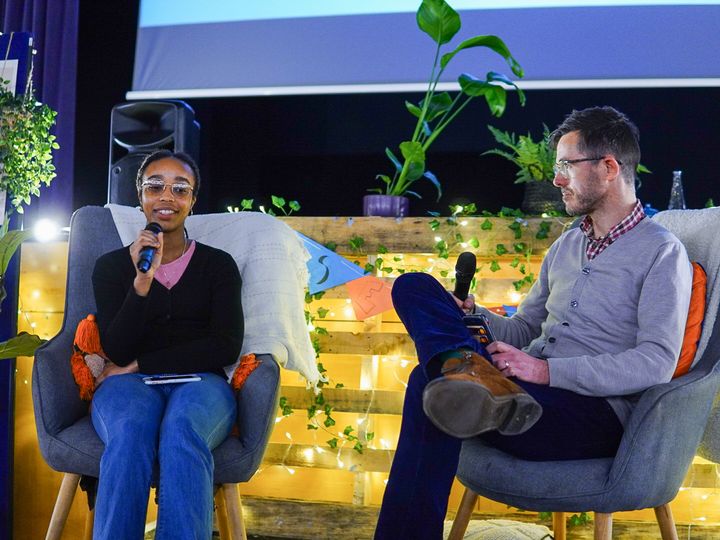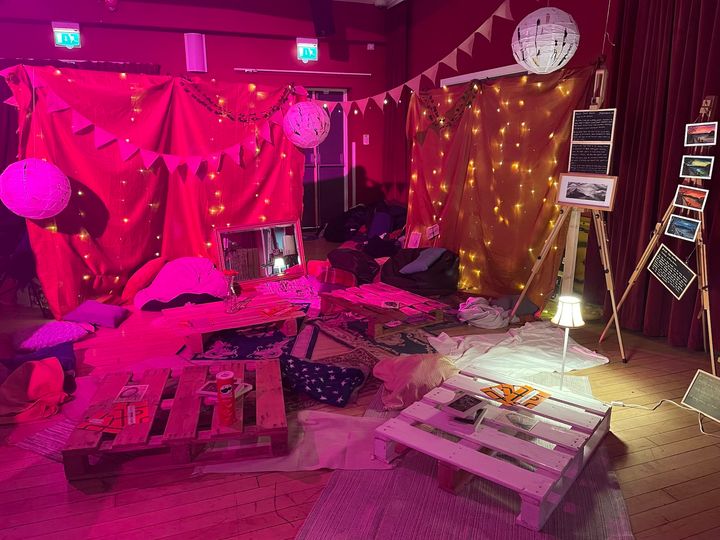It is good to think about including various other elements around or within the talk (especially in Evening Events where you have more time). There are several advantages to this:
- It helps break up the evening and holds people’s attention.
- It communicates the gospel through different media.
- It can speak to the heart, as well as the head.
It is important to work with your speaker, as they need to understand how the evening will fit together and are happy with the suggested format. They may also have ideas of their own which they would like to suggest.
Videos
There are different types of video you could use:
- Intro video — a short video introducing the theme of the week. This could be shown at the start of each event as a way of getting people’s attention and setting up the event. Here are some good examples…
- Follow-up video — an effective way of clearly and creatively communicating the possible next steps that students could make after the talk. This can be more engaging than just a verbal notice and makes sure that this vital information is clearly communicated after every event.
- Film clips — there may be appropriate film clips / reels from social media, etc that connect with the theme of the evening.
Stories
As people hear about the difference that Jesus has made in someone’s life, the gospel often becomes more tangible and believable.
This can be a short 2–3 minutes’ interview with a student, inserted into the talk at an appropriate point. Or you could also have an extended interview with someone external to the CU who has a particularly interesting or relevant story… conducted before the talk. This may also be included in your advertising, e.g. A well-known academic, a sports person, someone who has experienced bereavement, etc.
There are advantages and disadvantages of both. Bringing in a famous person or someone with a dramatic story can make for an easy invitation (e.g. ‘come and hear the story of a guy who escaped from North Korea!’), but carries the danger of feeling somewhat removed from the average student experience. The interview will also need to be extensive enough to justify the interviewee’s travel. Using students to share testimonies can connect well with the audience… but won’t necessarily help make the invitation more attractive. You could, of course, use a combination of both.

Creative Arts
Using the creative arts can help people grasp something of the beauty of the gospel. In doing so we connect, not just with the head, but also the heart.
- Music — Some Christian musicians write music to be evangelistic (as opposed to Christian ‘worship’ music). This can raise questions in people’s minds, as well as drive home certain points. One or two carefully selected pieces can be very effective. Music at the end of the talk can also give people an opportunity to reflect on what they have heard and consider what their response will be. Here’s an example of how this was done — these pieces of music were interspersed throughout the evening between talk, testimonies, questions, etc.
- Art — Could you use artwork in the venue which is connected with the theme of the week? You could run an art / photography competition connected to the theme and show entries around the room.

- Drama — It is possible to do drama ‘in house’, even if you don’t have drama students, and for it not to be embarrassing. Drama can be used, at the start of a talk, to raise a question in a thoughtful or humorous way, or to drive home a key point later on. Ensure that drama is well rehearsed, and that the speaker has seen it before the talk. People in the drama can use their acting as a further reason to invite friends.You may also want to consider hosting The Mark Drama in preparation for your Events Week.
- Spoken Word / Poetry — Are there students in the CU, or the CUG team, who are gifted in this medium and could write something that will be appropriate for the event? If not, could someone record a video and send it in? Or are there videos online that you could use?
Discussion Times
Why not start the evening with an open discussion to get people thinking about the theme of the evening and increase engagement? The hosts or the speaker could invite responses from the audience, and, in doing so, create more of a connection with the room. The speaker may want to consider breaking up the talk at various points to invite discussion too. See Discussion Events for more information about such events.
Things to do
- Dream. Consider what creative elements you may want to include in your events.
- Research. Find out who you may know / have contact with who could be asked to participate in these different areas. Ask other CUs to find out who they have asked.
- Communicate. Discuss with your speaker and find out what creative elements they would be happy with. You could ask whether they have any suggestions of their own.